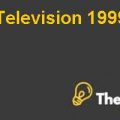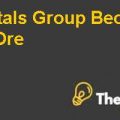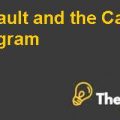
QUESTION 1
ZEUS’s INVESTMENT PHILOSOPHY
The investment philosophy of the management of Zeus is based on the fact that the results of the investment or the return over the investment could be only achieved over the years by following a risk averse and conservative approach to the management of the risk. This ensures that the portfolio manager of the company works hard to deliver the best performance that is relatively the same as compared to the benchmark’s performance. The equity fund seeks for growth which is for the long term, when the earnings from the stocks are expected to grow above average rates.
ZEUS’s PRIMARY INVESTORS
The primary investors of Zeus consist of both the individuals and the institutional investors. The institutional investors come from corporations, endowments and foundations. On the other hand, the individual investors consist of high net worth and the risk averse investors that want to invest their assets for long periods and achieve growth.
INDIVIDUALLY MANAGED ACCOUNTS & MUTUAL FUNDS
The minimum requirement for the individually managed accounts is $ 2 million. Zeus used to customize the portfolios for these clients according to the investment objectives of these clients and afterwards it balanced the volatility and the time horizon of these investments. For other types of people or groups that did not have the minimum capital requirement, then these individuals could invest in the specialty funds. Zeus had established multiple mutual funds because of the domestic equity, bond and the international equity market. Apart from this, Zeus also provided fixed income securities and high quality equities both combined in balanced fund.
QUESTION 2
CURRENT INVESTMENT PROCESS OF ZEUS
Whenever any new director was hired by the management of the company, he started to establish a new investment process for the established portfolios of the company. He also developed a set of strict policies to manage those portfolios. This enhanced the controlling and the monitoring process of the company. The current process of investment of Zeus helped the management to identify the profitable bonds and equities. The bonds and equities were then converted into portfolios which minimized the overall risks and maximized the overall returns. This investment process made the company a good choice for investment especially for those individuals that were risk averse and conservative investors. Although, the new investment process had many advantages for Zeus but it might cost the company more of its time and the hiring of intelligent fund managers.
QUESTION 3
ZEUS’s INVESTMENT STRATEGY
The investment philosophy of Zeus is very much different and unique from all of the investment management firms. Zeus does not believe in earning high returns by investing in high frequency trading in the short term. The belief of the management of Zeus was based on the minimization of the risk and the long term investment which will ultimately give its investors higher returns. They use strategic asset allocation process to invest in different areas. Apart from that, the company also invests in the large caps because of the lower risk of the overall portfolio. In addition to this, the management of the company also invests in the medium and large caps due to the low risk profile of the individual investors as compared to the smaller caps in which the risk is very high. The customer base of Zeus was also high due to good strategic investments made by the company. The strategy of the company is based on the fact that the company has to pay special attention to satisfy the needs of the client. One of the issues in this matter is how much tax different individuals pay based on their respective tax brackets. The fund managers of the company help these investors to choose those securities that provide them with the best after tax returns. The company is performing well and it should continue the same strategy for its future as well.
QUESTION 4
PERFORMANCE OF ZEUS’s EQUITY, BONDS $ BALANCED FUNDS
The performance of the equity fund was below S&P 500 and the Lipper growth index during the first sub period. This was because of a week cash policy. However, at the end of the sub period 1 new investment policies and stricter process to screen the stocks were developed which improved the performance of the stocks and improved the controlling and the monitoring process of the core holdings of the company. Due to these changes the equity funds of Zeus achieved higher returns in the second period as compared to the first period. The Zeus equity fund had a higher annualized return of 16.88% than the Lipper growth index with the return of 16.83%. This annualized return for Zeus was also better than the return of S& P 500. On the basis of the Sharpe ratio and Treynor’s measure, Zeus ratios outperformed the ratios of Lipper growth index. Altogether, the Zeus equity funds outperformed the Lipper growth index on the risk adjusted basis and also on absolute terms. Refer to the spreadsheet for the calculations of all the ratios.
The performance of the bond fund compared to the Lehman Brothers Aggregate Index was slightly lower. However, despite this low return, Zeus decided to stick to its conservative investment strategies which would result in constant and stable returns as compared to the returns of Lehman Brothers Aggregate Index.........................
This is just a sample partial case solution. Please place the order on the website to order your own originally done case solution.
In May 1998, research director of Zeus Asset Management is reflected in the current evaluation of the mutual funds of Zeus (including fund shares, Bond Fund, Balanced Fund and the Foundation for International) and ways to improve the measurement of productivity. Zeus became increasingly aware that the absolute return, or the relative profitability (profit in respect of the tests), will not suffice as a measure of performance and measurement (or a series of measurements) with a risk-adjusted performance should be added. Performance evaluation is a key to structure compensation and motivation in general, as well as strategic planning for the future of the company. Given the relative risk clients of Zeus, the "correct" measurement of risks is imperative. Students were asked to calculate the number of steps of the risk of work. Familiarity with regression model in Excel is required, on the contrary, it can be used to achieve this goal. The case comes with an Excel spreadsheet containing the relevant data (time series returns [minus the risk-free rate] of the three mutual funds and appropriate benchmark indices).
This Darden study. "Hide
by Giorgos Allayannis Source: Darden School of Business 7 pages. Publication Date: July 31, 1998. Prod. #: UV0084-PDF-ENG













